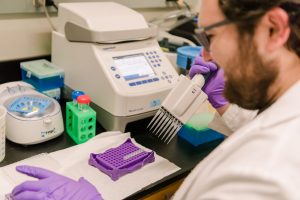
Evolution, a process that connects all living organisms, is defined quite simply as a “change in genetic material over time”. This process can be modeled with computers, measured in experimental settings and observed in the wild. Research in the biology department encompasses all of these approaches, with field studies of divergence and speciation in birds and fish, laboratory studies of aging and parasitism in fruit flies and computer simulations of primordial life, to name just a few. Students participating in the Evolution, Ecology and Behavior (EEB) area of specialization will carry out their thesis research in one of these fascinating areas. In addition, upon consultation with their thesis advisor and committee, students will choose three or more courses from the following list.
Courses of interest
- Advanced Topics in Cell Biology (BIOL 620)
- Immunology (BIOL 625)
- Approaches to Molecular Biology (BIOL 626)
- Introduction to Developmental Biology (BIOL 642)
- Advanced Topics in Developmental Biology (BIOL 643)
- Development and Cancer (BIOL 644)
- Signal Transduction (BIOL 645)
- Neurobiology (BIOL 651)
- Vision Science (BIOL 654)
- Plant Molecular Biology (BIOL 656)
- Animal Behavior (BIOL 680)
- Genome Science (BIOL 686)
- Chemical Communication and Brain Disorders (BIOL 690)
- Courses from other AOS
Faculty
Charles Bieberich: Cancer biology
Mercedes Burns, Evolution of sex and reproductive traits
Thomas Cronin: Visual ecology
Jeff Leips: Genetic basis of aging
Weihong Lin: Neurobiology of chemosensory systems
Bernard Lohr: Auditory ecology
Tamra Mendelson: Evolution in communication systems
Stephen Miller: Development of green algae
Kevin Omland: Molecular phylogenies and population genetics
Achuth Padmanabhan: Cancer biology
Michelle Starz-Gaiano: Regulation of cell motility
Fernando Vonhoff: Neurodevelopment and degeneration